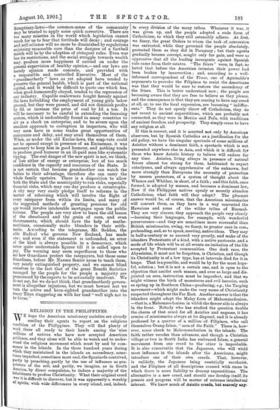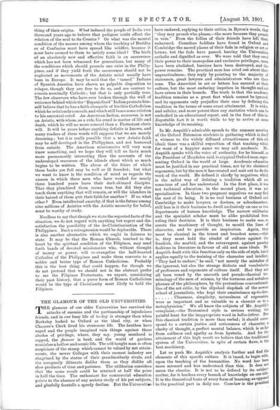RELIGION IN THE ,PHILIPPINES.
E hope the American missionarisocieties are already Tr sending their agents to report on the religious condition of the Philippines: They: will find- plenty Of work there all ready - to their lianda among, the.' nine millions of natives who have now accepted AmeriCan guid4nce, and they alone will be able to watch and to under- stand the religious movement which must by and by com- mence in the islands. In the three hundred years during Which 'they maintained in the-islands an ascendency. seine- times imperfecknometinies most real, the-Spaniards contrived, -Partly by preaching,.partly by the use of influence as pro. piietors of the soil, and partly; .we imagine, as in South America, by direct compulsion, to induce a majority of the inhabitants to profess Christianity.- What their original creed was-it is difficult to discover, but it was apparently a worship of spirits; with wide differences in every island, and, indeed, In every division of the many tribes. Whatever it was,. it was given up, and the people adopted a rude form of Catholicism, to which. they still ostensibly adhere. At first, we fancy, the great Orders to whom the task- of, conversion was entrusted, while they governed the people absolutely, protected them as they did in Paraguay ; but their agents gradually. became corrupt; sought only for. gain, and were so oppressive that all the leading insurgents against Spanish rule came from their estates. "The friars 7 were, in fact, so hated that before the American invasion their power had been broken by insurrection ; and, according to a well- informed correspondent of the .Times, one of Aguinaldo's arguments to-provoke the Filipinos to resist the Americans was that they would be sure to restore the ascendency of the friars. This is better understood' now; the people are beconting aware that they are free to believe as they please, and the consequence is that they are ceasing to have any creed at all, or, to use the local expression, are becoming " indiffer. ents." They do not openly throw off Catholicism, they, do not revert to ancient .superstitions,. which are probably:mot connected, as they were in Mexico and Peilu, with, traditions of ancient freedom and prosperity. They simply cease to have any religion at all.
If this is correct, and .it is asserted not only by. American observers, but by Spanish Catholics as a justification.kir..tie old policy, we have the singular spectacle of some millions of Asiatics without 'a dominant faith, a spectacle which is not presented anywhere else in Asia, and.which it- is difficult. fcr those who know Asiatic history to believe will endure - fqr any time. • Asiatics, living always in presence of natural forces almost too strong for them, habituated to expect cataclysms, and always apprehensive of the unknown, feel more strongly than Europeans the necessity of • protection by unseen protectors, of a system of thought about the Whence and Whither, in short, of a faith; and this faith, once fornied, is adopted by masses, and becomes a dominant law. Now if the Philippine natives openly or secretly abandon Catholicism, what faith will they adopt? The pleasant answer would be, of course, that the. American missionaries will convert them, as they have in a way converted, the Hawaians and some of the wilder tribes of Burmah. They are very sincere, they approach the people very closely —learning their languages; for example, with wonderful perseverance—and they are sometimes more successful than British missionaries, owing, we fancy, to greater care in cora. prehending, and, so to speak, meeting, native ideas. They, may in half-a-century or so succeed very greatly, and make of the islanders Protestants of a kind, with a native pastorate, and "a mode of life which will be at all.events an imitation of the life accepted by Protestant communities. One dark race, the Abyssinian, it must not be forgotten, is Christian, and though its Christianity is of a low type, ha,s•at intervals died for it in heaps. That is a possible, and would be by far the most hepe- ftil, solution ; but it ie not a certain one, and is open to the objection that:amidst such masses, and over so large and die. jointed an area, instruction must be imperfect, and that we Might witness the birth of monstrous 'and evil heresies, such as spring up in Southern China—producing,,e.g., the Teeping movement-which might make the very name of Christianity suspected throughout the Par East. Another answer is that the islanders might adopt the Malay form of Mahommedanism, —that is, a Mahommedanism in which the fiercer side is alSvays in the front. Nobody who- has studied • the question doubts the charm of that creed. fora all Asiatics and. negroes, it has armies of missionaries always at its disposal, and it is already professed by a quarter of a million : -who call themiiehes °rang-Wain; men of the Faith." There- is, how- ever, some cheek to Mahommedanism: in the islands. The faith rather recedes thin 'advances, and. though' a -Christian village or two in.- South India has embraced Islam; a generiil movement . from one • creed- to the' other is improbahli. It is also conceivable that the. Japanese,. who will wield most influence. in the islands after ' the Americans, might introduce- one their own creeds. That,' however, is unlikely, the' Japanese being essentially secularist, and the Filipinos of all .descriptions crossed with .races 'in which there is more liability to dreamy superstitions. • The alternative is a new creed; and should one develop itself, its genesis and progress will be matter of • extreme intellectual interest. We know much of Asiatic• creeds, but scarcely any-
thing of their origins. What induced the people of India two thousand years ago to believe that pedigree could affect the relation of the soul to its Creator ? Or what was the mental condition of the masses among whom the teaching of Buddha or of Confucius must have spread like wildfire, because it must have seemed to them to satisfy some ideal ? The birth of an absolutely new and effective faith is an occurrence which has not been witnessed for generations, but many of the conditions which should precede one exist in the Philip- pines, and if they yield fruit the occurrence should not be neglected as movements of the Asiatic mind usually have been in Europe. It may be said that the " tamed" Indians of Spanish America have shown no palpable disposition to relapse, though they are free to do so, and are content to remain nominally Catholic ; but that is only partially true. The few observers who have ever broken through the wall of reticence behind which the "Espaniolised" Indian protects him- self believe that he has a faith alongside of his thin Catholicism which he sedulously conceals, and which still bears some relation to his ancestral creed. An American Indian, moreover, is not an Asiatic, with whom, as a rule, his creed is matter of life and death, which he will no more conceal than a Protestant cleric will. It will be years before anything definite is known, and many readers of these words will suppose that we are merely dreaming; but it is really possible that a new Asiatic faith may be self-developed in the Philippines, and not borrowed from outside. The American missionaries will very soon know something, and we hope they will tell us facts much more permanently interesting than the accounts of the undeveloped resources of the islands about which so much begins to be written. The abuse of the friars of which these books are full may be well or ill founded; but what we want to know is the condition of mind as reeards the unseen in which these • men who have worked for nearly three hundred years leave their dark-skinned disciples. That they plundered them seems true, but did they also teach them anything that will remain, or will the islanders in their hatred of them quit their faith for another ? If so, what other ? Even intellectual anarchy, if that is the future among nine millions of Asiatics with the Asiatic necessity for belief, must be worthy of study.
Needless to say that though we state the reported facts of the situation, we do not regard with anything but regret and dis- satisfaction the possibility of the de-Christianisation of the Philippines. Such a retrogression would be deplorable. There is also another alternative which we ought in fairness to state. It may be that the Roman, Church, touched to the heart by the spiritual condition of the Filipinos, may send forth bands of devoted missionaries who, without thought of money or power, will re-evangelise the half-hearted Catholics of the Philippines and make them converts to a nobler and better type of Roman Catholicism. Probably this is the best thing that could happen, for though we do not pretend that we should not in the abstract prefer to see the Filipinos Protestants, we expect, considering their past history, that a purer form of Roman Catholicism would be the type of Christianity most likely to hold the Filipinos.



































 Previous page
Previous page